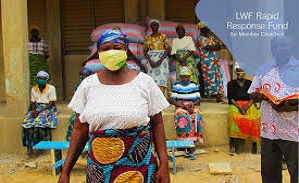COVID 19: A time to “look out for the most vulnerable” in Ghana
LWF’s support bridged a critical gap for elderly and widowed church members
 (LWI) – When the government imposed a nationwide lockdown to prevent the spread of the coronavirus disease in March, the Evangelical Lutheran Church of Ghana (ELCG) was concerned that some of its members would have a hard time meeting basic daily food needs and keeping safe during the pandemic.
(LWI) – When the government imposed a nationwide lockdown to prevent the spread of the coronavirus disease in March, the Evangelical Lutheran Church of Ghana (ELCG) was concerned that some of its members would have a hard time meeting basic daily food needs and keeping safe during the pandemic.
Using its network of 12 congregations and 108 preaching stations, the ELCG leadership focused its attention on the most vulnerable members among its elderly and widowed families—households that would normally depend on produce and income from small-scale agriculture and trading.
With support from The Lutheran World Federation (LWF) COVID-19 Rapid Response Fund (RRF), the ELCG assisted 120 families with assorted food items, hand-washing and sanitizing kits. Through the RRF, requesting churches received an amount of up to EUR 5,000 toward efforts aimed at reducing the impact of the coronavirus pandemic.
“When the coronavirus struck, we were concerned for church family members, who are already struggling. Any additional disruptions can have catastrophic impact on such people and they need reassurance that the church is always there for them,” said ELCG General Secretary Rev. Joseph Minnow Bart-Plange.
Enough food until the next harvest
Madam Martha Abugri, a member of Grace Lutheran Church in Narango town in the Upper Eastern region was among 13 widows who each received 200 kilograms of maize, cooking oil, soap, hand sanitizers and face masks. “At this time of the pandemic, when it is difficult to get money, I am very glad to receive two bags [each 100 kgs.] of maize and other assorted items. This will help me till we harvest the early millet in August.”
For Mary Akudugu, the ELCG support found her family at one of their lowest moments. “Almost all my foodstuff was finished and I did not know where I could get either food or money to buy maize. This is a God-sent gift. Truly the Lord answers prayers using other people,” she told regional pastor Rev. Dr Nicholas Salifu upon receiving her consignment at Faith Lutheran Church in Wiidi town.
Several other families received assistance in Nasuan, Gbintiri and Yendi districts in the Northern region, where the ELCG community development programs include agricultural programs to improve crop productivity.
Spread goodwill in the community
While the support directly targets church members, the goodwill spreads across communities. “This gift -- I will not use it alone because there are many women like me who need help. I will share part of it with them,” said Ms Dorothy Amoasi, who received assorted food items at the Resurrection Lutheran Church in Abandzi town, Central region.
This gift -- I will not use it alone because there are many women like me who need help. I will share part of it with them,
— Ms Dorothy Amoasi, ELCG Resurrection Lutheran Church
Bart-Plange said LWF’s timely support “bridged a very critical gap” in the ELCG during March to July when many activities were prohibited or scaled down as part of the government’s COVID-19 measures. “The suspension of in-person Sunday worship and other gatherings locked out the regular weekly offerings on which the church relies to carry out the bulk of its ministry of proclaiming the gospel and serving people in need.”
Safety regulations for in-person worship
With the easing of lockdown in early August, ELCG congregations are open for in-person worship, with attendees respecting the health safety guidelines. The number of participants in a church service is limited to a maximum of 100 people and it should not last more than 120 minutes.
Bart-Plange says that while Ghana experienced relatively low numbers of coronavirus cases at the beginning of the pandemic, “the current situation is very worrying” because the infections are spiking. On 20 April when the government relaxed its first three-week partial lockdown with the goal to keep the country’s economy afloat, it had recorded 1,042 COVID-19 cases and nine deaths. As activities picked up, the number of infections rose to 35,500 and 182 deaths by the end of July. In November, he notes, “we are not in a good place with more than 51,000 infections and over 320 deaths.”
The general secretary says the ELCG will continue to respect the government’s safety guidelines as its pastors and congregation members “look out for the most vulnerable people in the church and the wider community.”
By LWF/P. Mumia
Suorce: https://www.lutheranworld.org/
